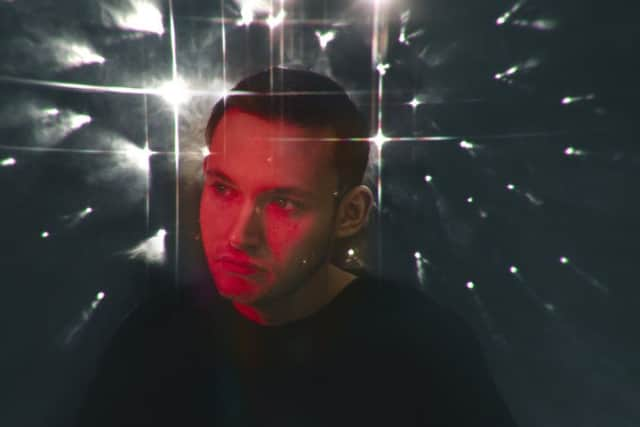Scots DJ Hudson Mohawke on his new album Lantern


When Ross Birchard takes my phone call, it’s mid-morning in New York and he’s just woken up in his hotel room. Tonight is a big night – ahead of the release of his second record Lantern on seminal electronic label Warp, the 29-year-old Glaswegian and sometime producer for huge international stars Kanye West and Drake will debut his new live set at the city’s Irving Plaza venue. “It’s about putting across the breadth of my musical taste rather than just making a record of bangers,” says Birchard, aka Hudson Mohawke of the new album (his diverse but club-friendly talent so mercurial that both Calvin Harris and Radiohead’s Thom Yorke have dropped his music in their sets.)
“How am I feeling?” he wonders. “Well I’m excited, obviously, and I’m not feeling too nervous about it. Having spent the best part of the last five or six years travelling round DJing, I wanted to do something special for this record, something more challenging for myself. It felt like the next logical step.”
Advertisement
Hide AdAfter the fact it seemed to have gone well; hipster website Vice’s music writing arm Noisey said he, keyboard player Redinho (Tom Calvert) and drummer Ben Thompson, also of electro-indie outfit Two Door Cinema Club, “torched” the place, while music blog Consequence of Sound said the show was improved by its “unpredictability”.


It’s a long way from the West End of Glasgow “between the university and Partick” where Birchard grew up. His mother still lives there, but he and his three sisters have all moved away, while his actor father Paul uses the city as a base for his work. At this point it’s worth flagging up Birchard Snr’s career, which puts even his son’s polymath achievements in the shade. He’s worked in film on both Tim Burton’s original Batman and Christopher Nolan’s The Dark Knight, as well as titles like Memphis Belle, Hanna and The Angel’s Share, while his stage appearances include the National Theatre, the Old Vic (as understudy to Kevin Spacey) and Edinburgh’s Traverse – he’s currently in the RSC’s Death of a Salesman.
His son’s own exceptional achievements in music began at a young age, and through an unlikely source. “The first music I was into was rave and happy hardcore,” Birchard says, referring to the screechy, heavy-beated form of high-energy dance music popular with livelier young Scottish audiences. “I got a mix tape of it from my cousin when I was about nine, still in primary school. Too young to go to any of the events, but I also had no idea of the context of the music or the stigma attached to it. I was so young that I could listen to it on a purely musical level and decide that it was something I really loved. I’d make little mix tapes and sell them around the playground at primary school.”
That was where his career started, and it would hit another peak as he arrived in his mid-teens, when at 15 he became the youngest ever finalist (using the pseudonym DJ Itchy) at the UK-wide heats of the DMC World DJ Championships. “That’s where my love of hip-hop came from, because it’s mainly used by DJs in these ‘battles’,” says Birchard. “This was around 12, 13, and I was glad I got into it at that age because it allowed me to see there are good and bad sides. It gave me the experience of performing in front of big crowds in London at a very young age, but it also opened my eyes to the fact that there’s a bit of a glass ceiling in that world.
“I was gradually seeing that the people who were winning these championships never went on to make any sort of career in music,” he continues. “The original DJ battles from the 1970s and 80s in New York were based on having a good party, whereas since then the competition scene’s more about technicality, and it was becoming stagnant. That’s part of the reason I thought I’d rather focus my creativity on making music rather than just trying to be better than the next guy.”
He began to play around Glasgow, at first mainly at hip-hop nights, while developing his own style. He met other young DJs, producers and creatives who would go on to define a particular Glaswegian sound now famed amongst club connoisseurs internationally. Birchard is still a key player in the Numbers and LuckyMe label and party promoter collectives which are important to the city’s current image as a clubbing destination, yet he’s keen to make clear that he’s anything but the scene’s only success story.
Advertisement
Hide Ad“Obviously Jackmaster’s [Jack Revill] touring all the time, he had his own Radio 1 show,” says Birchard. “Eclair Fifi [Clair Stirling] had her Radio 1 show too, Rustie’s [Russell Whyte, also a producer signed to Warp] touring continuously, S-Type’s [Bobby Perman] always touring. There’s been this thing in the last couple of years about the ‘Glasgow scene’, and it’s been very fortunate that we’ve all had the opportunity to progress, but I’d never say I’m the breakaway from that. Everyone has gone forward in their own endeavours. Clair’s been on billboards in Times Square in New York (as part of a music-related H&M campaign in 2014), stuff that wasn’t imaginable a couple of years ago.”
He seems nothing if not driven and able to find opportunities, but how did Birchard go from local success to working with some of the planet’s biggest artists? “The same way I signed with Warp,” he says. “A lot of A&Rs just flatly won’t listen to new demos, so unless someone tips them off they aren’t interested. I’d been trying to reach out to Kanye and a number of A-list artists for some time, so when his people eventually approached me I was like, ‘I have been trying to send you music for years, I don’t know if you’ve listened to it?’ They hadn’t, but someone had tipped them off to contact me and it went from there. It was just a case of receiving an email one day, and similarly with the Drake stuff, I got up in a daze one morning and I had a Twitter message from him asking to work together. It was quite surreal, but I’d wanted this for some time.”
Advertisement
Hide AdWhat’s West like to work with? “You’re starstruck the first couple of times,” says Birchard, “but once you’re in the room working with someone and they don’t have to maintain a particular persona, it just comes down to making music. That’s really refreshing, it’s a whole different side to them, but I tend not to speak too much about the behind closed doors kind of thing. Kanye’s very interesting and open to work with.”
After half a decade of success as a producer for others – and with his and Canadian producer Lunice’s TNGHT project – Lantern is a conscious effort by Birchard to take back control of his solo recording career. He shares a laugh about one of the advance tracks, Scud Books, and whether anyone outside Scotland will get the risqué title reference, and says that the more orchestral track Kettles and the Antony Hegarty collaboration Indian Steps are particularly pleasing because they show the way he wants to go in future – into soundtracks and producing more diverse artists, with Hegarty’s upcoming full-length project his next work.
“I’m trying to break out of the beatmaker role and be seen as more of a musician, I guess,” says Birchard. “It’s a natural progression. I think I’m really happy to work in that world, but as far as my being a pop act goes, it’s far from what I want to do. It doesn’t really suit my personality. I still really love doing the live performances, but I’d sooner be in the studio working than on a microphone screaming at a crowd.”
• Lantern by Hudson Mohawke is released on Monday on Warp. He’ll be touring the UK and Europe over the summer, hudsonmohawke.com